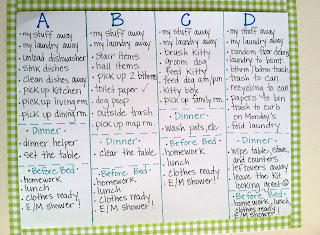I have four children (2 girls and 2 boys), and they have grown up completing various household chores. I figure they need to learn and I need the help! Recently, we've all become a bit slack in chore standards and "guess who" has been fixing all the messes!!
So, a chore chart re-do was in order and I just finished it. I also just finished my little chat with my
Here is a picture of their new daily chore chart:
The children are assigned a letter for one week. On Mondays, they switch to a new letter. When the children switch every week, they are less bored, the chores are now "fair", and everyone learns how do everything.
The first chores listed under "A, B, C, and D" are the afternoon chores. The children begin them about half hour after returning home from school (they need some down time to snack, etc). Dinner chores are self-explanatory. Before bed chores are just a gentle reminder for preparing themselves for school.
Here is a picture of their individual name labels which move from one letter to the next each week:
The items under each name are "morning chores". They never made their bed (yikes! sorry, world!) and so that is why I included it for their morning routine. It takes 30 seconds, people! Why make your bed if you don't make it until the afternoon and are messing it up merely a couple of hours later? The point is...what?
Here are their names above the daily chore chart:
Make sense? I've always done it this way, and it seems to work really great for everyone. When my youngest was too little to participate in everyone's chores, I kept him alone in the "D" slot. It consisted of easier chores he could complete.
Most of their daily chores take hardly any time. I would guess the entire thing will take them about 30 minutes each. Sometimes it will be way less, and there may be days when they have no homework and I need a little more help from them. I revamped this chore chart to include more things since I will be student teaching and then teaching full-time this fall. I love working on the house, but I won't have as much time! The chore chart is easier than waving a white flag or wearing grumpy pants because nobody helps me.
How old are my children? Andrew is 16, Linnea is 14, Emily is 12 and Matthew is 10. Yes, they are old enough to be a major help to our family. It wasn't always this way. I remember when Andrew was 6 and it went on down from there. There were more messes then helpers!! When the children were little they obviously couldn't help as much, but they did what they could. I think the key to children doing chores is starting early and keeping it going. If you ask my children, they'll tell you they've always done chores and they don't really think much about it. Of course they'd rather NOT (me too!!), but they know I expect it and that's that.
Saturday chores are a little different. We clean the house once a week, and I've trained the kids to basically clean the entire house by themselves. I sit back and eat bon-bons while they slave away. Just kidding. I'm usually immersed in some productive activity which goes along with one of their chores. Here's a look at the Saturday chore list:
We've talked about what each chore means and what the expectations are. I NEVER expect perfection, just their best. I can tell if a child is rushing through because they don't care, or if they simply missed something. I praise often and thank them for helping out. My 10 year old knows how to clean a bathroom, and that's a beautiful thing!
I have everything in our hallway on our family bulletin board. It includes both chore lists, a list "To Buy" (I use recycled envelopes mostly), and a list of dinners to make (from ingredients I have on hand). Each Monday, the names are rotated one space to the right. The ribbon hanging down in the middle has a pencil tied to it.
If you have any questions, just ask! How did I figure out what to put on my chore list? Well, I've tweaked the same chart for years, but it all began with answering this question: What bugs me? Things on the stairs bug me. Trash overflowing bugs me. This chart system is personal to you, so make it your own!
Directions:
- Create a list of what bugs you. Ask yourself if your children's ages can handle cleaning up these things.
- Assign those chores to different "letters" if you have more than one child.
- Create a list of morning chores (this was very detailed when the children were small), afternoon chores (this works well with school aged children), and evening "get ready for school" duties. Or, make a different chore time for your family.
- Create a name list/card for each child. With small children, you can include their picture.
- Want help on Saturdays? Or only on Saturdays? Make a list, divide it up, and begin teaching them how to clean the items on your list.
- Change the names every Monday (or pick a different day!).
- Make it pretty or leave it plain. It's totally up to you!
- Small children? I used to have pictures to go with each chore, so my pre-readers could remember which chore it was.
Have fun!!!






















